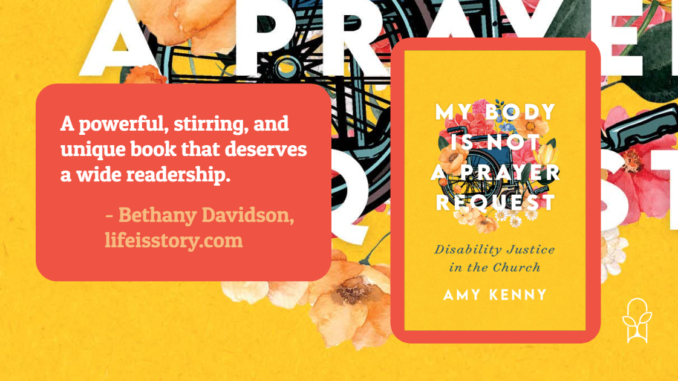
Also by this author: My Body Is Not a Prayer Request: Disability Justice in the Church
Published by Brazos Press on May 17, 2022
Genres: Non-Fiction, Christian Life, Memoir
Buy on Amazon
Goodreads

The church has forgotten that we worship a disabled God whose wounds survived resurrection, says Amy Kenny. It is time for the church to start treating disabled people as full members of the body of Christ who have much more to offer than a miraculous cure narrative and to learn from their embodied experiences.
Written by a disabled Christian, this book shows that the church is missing out on the prophetic witness and blessing of disability. Kenny reflects on her experiences inside the church to expose unintentional ableism and cast a new vision for Christian communities to engage disability justice. She shows that until we cultivate church spaces where people with disabilities can fully belong, flourish, and lead, we are not valuing the diverse members of the body of Christ.
Offering a unique blend of personal storytelling, fresh and compelling writing, biblical exegesis, and practical application, this book invites readers to participate in disability justice and create a more inclusive community in church and parachurch spaces. Engaging content such as reflection questions and top-ten lists are included.
In My Body is Not a Prayer Request, Amy Kenny writes with passion and urgency, challenging ableist norms in the church and in society at large. She shares personal stories about facing both active discrimination and “mosquito bites” of smaller offenses that build up over time, showing her readers how painful it is for disabled people to constantly feel like they are less valued, overlooked, or viewed as projects. She pushes back against false theologies that assume that disability is the result of sin or a lack of faith, and she also pushes back against ingrained cultural norms that make many people oblivious to how they are causing harm to disabled people or failing to provide appropriate accommodations. In all of this, she emphasizes that disabled people have gifts to share with the church, and that someone doesn’t have less of the Holy Spirit just because of a physical or mental ailment.
Kenny writes in a humorous, vivid, and personal way. Her snarky humor sometimes seemed too harsh to me, in the sense that I would rein it back if I were writing something similar, but her passion for the subject is clear, and she writes in an invitational and persuasive way. Although she does not mince words when calling people out, she desires to bring people into her cause instead of shaming them, and she shares positive examples of how people can grow and change. Her personal stories and passionate explanations can help disabled people feel seen and validated, and can help able-bodied people understand the world in a new way.
Because I read an advance reading copy taken from uncorrected proofs, I will not get into any of my specific critiques, since I do not know what will change before publication. However, I have some theological disagreements with the author, and even though I encountered her different perspective with an open mind, I felt that she moved on too quickly from some controversial statements without supporting them with enough logical explanation or Scriptural background for me to fully understand her beliefs, let alone consider them for myself. However, even though I would not endorse everything Kenny says, this is a powerful, stirring, and unique book that deserves a wide readership.
